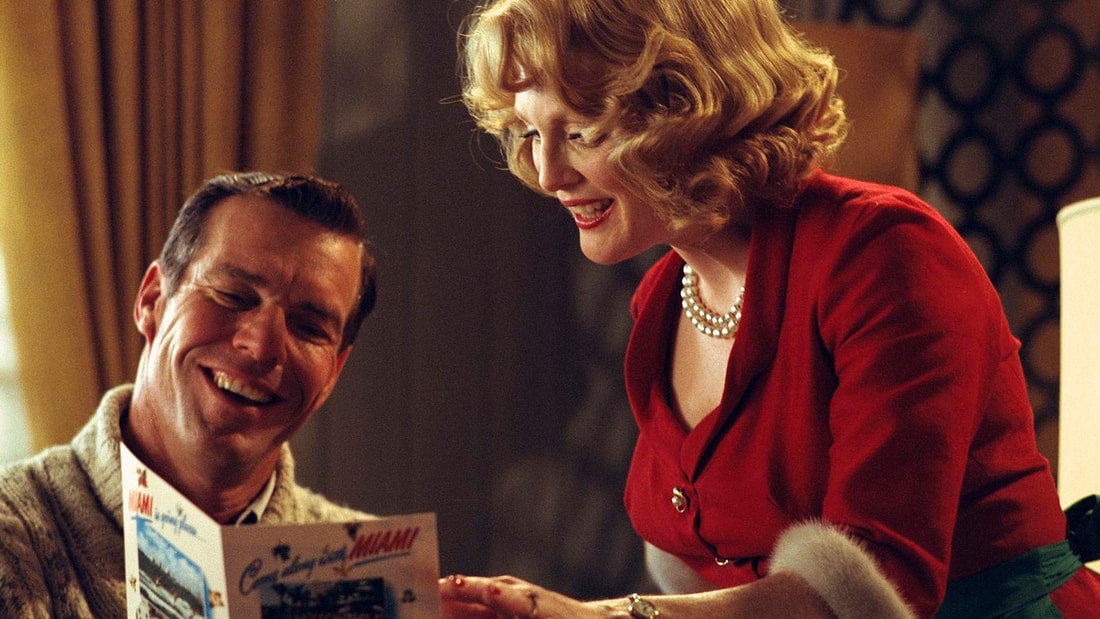In her loneliness and her shock, Cathy finds solace in conversation with her new handyman, Raymond Deagan (Dennis Haysbert). Taking over for his recently deceased father, who Cathy didn’t know had died, the friendly Raymond appears in the Whitaker’s backyard one afternoon, sending Cathy into a panic in a palpable and unflattering way. She calms down and gets more acquainted with Raymond, who’s also a widower and a college graduate who plans to start a business. Their conversations turn into random encounters around town and then planned ones, sparking whispers and stares from citizens of both races. Despite the approbation, Cathy can’t help but be drawn to an intelligent and well-spoken man who finds her attractive, something she’s been missing for the majority, if not the entirety, of her marriage.
Far From Heaven is nakedly concerned with the suffocating repression found in 1950’s society, but it refrains from speechifying and statements pitched squarely at a 21st century audience. One can feel that Haynes, a gay man, has an intense irritation with 50’s repression but that he also admires the ways the filmmakers of the 50’s and 60’s communicated the absurdity of mid-century social standards despite the censorious restrictions of the time. There’s little here to differentiate it on those terms from a film made decades ago, both in how coyly it plays with fadeouts and in the unsubtle ways it dances around homosexuality without naming it, like an ignorant audience would miss the reference but an in-the-know crowd would snicker and nod.
The racial politics of the film are more angry, since that part can’t be hidden in back rooms and office liaisons. All these rich New Englanders fancy themselves as liberal-minded modern men and women, not like those rubes and racists in the south, though they also think nothing of making jokes about there being no black people to integrate into schools in Connecticut within earshot of their black maids and servants. That a movie like Green Book can pretend that race relations get magically solved past a certain latitude and Far From Heaven can lacerate that thinking sixteen years earlier is an infuriating lack of cultural progress.
In imitating a style of film from an earlier time, Haynes also asks his cast to do the same with their performances. This is especially apparent with Moore, who’s also playing the most performative character. Her Cathy isn’t as naturalistic as Moore’s best performances, but there are many barriers she would need to break for Cathy to get close to an honest place. Her surroundings have made truth impossible, such that when her kids see their dad crying, they react with sheer panic at the release of raw emotion. If Cathy can’t fully voice what she’s feeling, Moore can wear her inner turmoil on her face, which she does in the film’s many longing looks. As her husband, Quaid’s self-hating agony manifests in drunken frustration and impotence. He’s theoretically the film’s most sympathetic character, though the last vestiges of expectation and masculinity drive him toward cruel behavior. Haysbert’s Raymond is the least complicated main character, tasked with exuding goodness so as to put a fine line under how ridiculous all these social restrictions are. He does indeed exude, but it makes him thinner than Cathy or Frank.
In paying homage to suburban melodramas, Haynes creates a throwback that a mid-century moviegoer might find indistinguishable from what’s playing in their time at the local cinema. Far From Heaven looks impeccable and tells an evergreen, compelling story, but Haynes will go on to top himself with Carol, another film from the same time period but one that’s more explicit and emotionally complex. Carol feels like it could only have been made in the modern era by Haynes, and is all the better for it. Far From Heaven is a seamless tribute with some harsh criticism, but as a commentary on a previously existing thing, it’s limited. That said, the tribute is so well-conceived that I feel like I’ve got a handle on everything Haynes is imitating. B+

 RSS Feed
RSS Feed